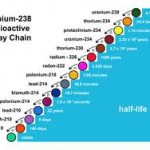– I wrote this story in three chunks as I traveled and soon after I returned to New Zealand. Now I’ve combined all three parts into one long narrative complete with photos and I’ve deleted the earlier fragments. It’s a long read but it’ll give you a good flavor of what my ten weeks traveling the U.S. West Coast was like.
– If I visited you, you are probably somewhere here in the story. Cheers!
– dennis
= = = = = = = = = = = = = = = = = = = = = = = = = =
Traveling and Writing
I have, in fact, been having a great time loose in America. And in among the traveling and visiting, I’ve managed to write a piece for the Sky Valley Chronicle about how healthcare in New Zealand differs from the U.S. system.

You can find it here 
Benicia, California and Dave’s
When I arrived into San Francisco on July 8th, I took the BART System out to Concord on the east side of the bay and met my friend, Dave, who lives in Benicia which is a cute little town out that way.

- View from Dave’s

- South Hampton Pool
I spent two weeks with Dave visiting, helping with a few things around his place and working on my tan.
Yes, my tan.
I am, indeed, a frivolous fellow and I’ve now morphed from a depths-of-the-winter white Kiwi into a tanned Southern California (SoCal) boy similar to the one I was in my boyhood. Except, of course, for the massive loss of hair and the serious prevalence of facial wrinkles. Not to mention a certain softness that hangs around what I former called my musculature.

- Backyard Irrigation
Dave and I worked on his back yard irrigation system and got it sorted out and functional. On another day, we drove to Bodega Bay on the coast north of San Francisco for lunch. This is where Alfred Hitchcock filmed the movie, “The Birds“, back in the 1950’s. All in all, it was a mellow and relaxing time at his place.
Irvine, California and Dan’s
After two weeks, on July 21st, I took off south to SoCal in Dave’s 2nd car which he’s been nice enough to loan me for this visit so that I can get around and avoid the car rental costs. Very nice and generous of him. And the car is a pleasure to drive. It is a pretty and rather muscular 1998 Chevy Camero, midnight blue in color.
A nice eight hour drive down the 5 Interstate Highway brought me to Irvine, California, where I settled into my older son, Dan’s, place for two weeks.
He had a full house with himself, his wife, Ann, and their two kids (my beloved grandchildren) Cody and Eden there.

- Dan and the rocket
In addition, my first wife (and Dan’s mother), Rose, was there already for a visit along with her sister, Alice, and Rose’s daughter, Jenny (from her second marriage).
On the first day, Dan took the group of us over to the local park to fire off rockets. It’s a hobby he and I shared when he was Cody’s age and he’s passed it on to his kids.
It was fun for me to come along and remember the rockets we’d had when he was young and to see the new ones. In truth, the rockets, their engines and the basic technology seemed much the same to me. And the excitement of firing one up many hundreds of feet up into the air and then seeing the little parachute open is still a great pleasure.

- Eden, happy rocketeer
It was a raucous good time had by all. Rose and I have managed to become excellent friends since our marriage ended back in 1979. We both each survived 2nd marriages (both ended as well). We share a lot of good memories and two excellent boys and I value the fact that we are still close.
There was more pool time in SoCal along with numerous trips to shopping centers, restaurants and such to fill the time. I always greatly enjoy my visits to Dan’s to see my grandchildren growing.
So many friends and visits
There were many highlights. Too many to list but a few were:
A most excellent lunch with Bernie, Ann’s father.
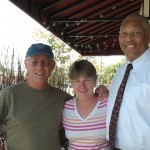
- Me, Rose and Charles
A trip with Rose up to Culver City in Los Angeles to see a good friend of ours who dates back to my university days, Charles Stewart III. On the way back, we came around Palos Verdes and down through my old haunts in San Pedro.

- Los Angeles Harbor from San Pedro
I went down, solo, to Oceanside, one day to see Marty, Sherry and Terri whom I’ve known for many years (since I was 13 or so).
Rose, Mary Lou, Alice, jenny and I had an excellent lunch in San Juan Capistrano one day.
On another day, I drove up to Long Beach, where I grew up, solo, to see my friend, Lisa Guest, who lives there.

- Lisa and Steve
Lisa and Steve, in San Juan Capistrano, had us (all) to their house at least three times for social events and meals. Rose, Dan and I have known Lisa since the 1980’s when we all lived in San Juan Capistrano and we consider her part of the family. I met Walt, a really nice guy and I saw our long term friend, Mark as well.
I worked with Dan a couple of days which gave us time for more in depth visits together. A most excellent time.

- Eden and Cody
I don’t know what to say about the grand kids. I love them immensely and so look forward to seeing how much they’ve grown in the the gaps between my visits. And Ann, sweet Ann. Dan has a most wonderful wife.
On August 3rd, it was time to head north again. On the way out of Los Angeles, I stopped again in Culver City to see another friend, Lise, a good friend from the mid-1980’s.

- Lise and Anthony
She’s been married and living up in Los Angeles since the late 1980’s and this is the first time I’ve seen her in all that time. We’d lost touch with each other for many years. We visited at her house for about three hours and I got to meet her husband, Anthony, who is quite nice.
Heading north through the eastern California desert
After that, it was off to the east where I sought out Highway 14, the Antelope Valley Highway, which takes you east and north up through Palmdale, Lancaster and then on up and past Edwards Air Force Base (of NASA fame).

- Desert Country
This is desert country. It is hot and windy. I rode along through the warm air with the music ripping and the windows down. It was a sweet time to have to myself thinking about my life.

- Lone Pine, Sierra Nevadas and the Moon
Finally, near sundown, I’d transitioned onto Highway 395N and I stopped at a town of 2000 souls called Lone Pine on the back side of the Sierra Nevada Mountains on the west and an enormous desert to the east.
I checked into a motel and at 9 PM, I walked the four block long main street listening to Country and Western Music pouring from the bars and feeling the warm 80F (27C) night air.
The next morning, I was up and driving by 8 AM heading north on Highway 395. I was looking at a terrible desert beauty on all sides. I kept shooting little iPhone movies and sending them off to Colette to show her what I was seeing.
Yosemite

- Yosemite is amazing
Later, I got to the junction of 395 and Highway 120 and I took 120 west and it took me into and through Yosemite National Park. Wow. I’d forgotten how nice this entire drive, including Yosemite, is.
Finally, late in the afternoon of Aug 4th, I got back to Dave’s place in Benicia.
Dave and Benicia – second visit

- Dave and the coast near Stinson Beach
During the several days I was with Dave on this visit, we drove over to the coast north of the Golden Gate to try to meet Dan and Ann and the kids who were up visiting friends in the Bay Area. We never actually connected with them because the traffic and parking were atrocious in the area where we were all to meet (at least I did not suffer much there thanks to my new convex mirror). But Dave and I had a great drive and saw some really pretty coast line.
It’s now Tuesday, August 7th and I’m preparing to depart on Thursday morning to drive up to Eugene , Oregon, to stay with my friends, Alan and Rita.
On this visit to Dave’s we’ve worked on the Camero. Fixed the turn signals and put new tires on it. It is a beautiful car and I think he intended to keep it for a long time. I feel quite privileged to be able to drive it on this trip.
Sweet cat – Coffee
In the day of so before I left Dave’s I shot a photo of his sweet shy cat, Coffee. I didn’t know it was going to be the last.

- Coffee Cat – RIP
Coffee was a cute little male rescue from Dave’s neighborhood. He’d had a tough life before he found Dave’s place. A few days after I left, Dave said Coffee’s health took a serious turn for the worse and he had to let him go. It made me sad that such a sweet creature had to depart and I know it was a heart breaker for Dave.
On to Eugene
After I left Dave’s place on August 9th, I drove up Interstate 5 to Eugene, Oregon, to see my friends, Rita & Alan, there.
There’s not much to be said about the drive. Interstate 5 is reasonable and fast but usually quite boring to drive.

On the road

My birthday cake!
I arrived at their place in the afternoon and they surprised me by knowing it was my birthday; even though I’d said nothing. They had a lovely little cake for me and made a bit of a fuss which was really quite sweet. I turned 65 that day.
During my time with them, Alan and I took an long walk down by the river and then drove out into the countryside and saw various small towns and parks along the way. We also went into a local brewery and tried their samplers. These are where you get 7 or 8 small beers to taste and compare.

Beer tasting fun with Alan
On Saturday, the 11th, Alan and I went to the Eugene Farmer’s Market and walked about. I must say, I really like Eugene’s funky laid-back feeling. There are just a lot of relaxed liberal minded people here. It gives the city a feeling that I like very much. Casual authenticity over stiff presentation. Interpersonal quality over impersonal quantity.
On that same afternoon, we went to an immense used book store; which I loved. Two stories and more books stacked from floor to ceiling than one could imagine. I got another Raymond Chandler – Phillip Marlowe book for my collection – all of which I am having great fun reading on this trip.
That evening, Alan, Rita and I went out for Sushi at a nice place. Enjoyable company. Outside, the evening was warn and the day’s ending light seemed to go on forever. People sat outside in sidewalk cafes and bars and everything has such a nice buzz.
On August 12th, Alan and I took a drive north up to Corvallis. It’s a town I’d heard of for a long time but never visited. It’s off a few miles west of the main North/South 5 Interstate so you have to intend to get there. It’s college town like Eugene but much less liberal / social studies oriented and more science and engineering focused. The town is vibrant and economically upbeat and we had a good time looking around.
Vancouver, Washington
Then, on the morning of August 13th, I departed – headed north again.
Very pretty countryside all through this part of Oregon. I passed through Portland wishing I had time to stop visit a few friends there but it was not to be. Portland is an amazing beautiful looking place from the elevated 5 Interstate as you go north through it and across the Colombia River.

Vancouver Park statue
I stopped in downtown Vancouver, Washington, just on the north shore of the river for a cup of coffee and had a walk around. I’d never thought much about this town but it was quite attractive. One could easily live here and then work in downtown Portland just across the river. Feeling curious, I went into some high-rise apartments there and asked about their rental costs. These were pretty steep for me. But I could imagine that I could afford units that were perhaps just a bit further out from the city’s core. I had to give Vancouver, Washington, a 9.
I have a friend named Joel who lives in Vancouver and I’d phoned him but gotten no answer. But, given that I had a GPS and it was therefore easy to find his place, I decided to drop by to see if he was there and simply not answering his phone.

Joel, my pirate friend
Ten minutes later, I was there – and he was too. So, we passed a nice 45 minutes visiting and catching up. I’ve known Joel since my university days in Long Beach, California. I’ve always called him my ‘Pirate’ friend for various reasons which make it a relatively true statement but which I won’t divulge here (smile).
After all these years, I don’t think things have changed with him. Mischief is always in his eye (smile).
After we visited, I was off again for Monroe, Washington, where I planned to stop for the night.
Monroe for the night
I chose Monroe because it was along my way to my destination in Canada. And because I’d lived there in the area for 20 years during my 2nd marriage.
My plan was to grab a cheap room in town and to drop into the local Starbucks in the morning and visit with friends there before I pressed on to Canada. I found the room and it was, indeed, cheap but it fit the purpose.
In the morning, I was up and over to Starbucks by 7 AM and I met several good friends there (by chance – no planning) and had a nice catch up with them.

Ed and his 'Baby'
Ed Fitzgerald came in with his car which he’s been fixing up for some time now. I remember, I was there the day he decided to buy it and fitz it up.
This Starbucks, and the people there, had been an important part of my life for ten years and I always love to go back, have a coffee and catch up with who ever’s about. I don’t think you can live in a place for 20 years and make many friends and then just walk away. I can’t, anyway.
My thanks, this morning, to Robert, Marty, Ed and Candice for good visits and good cheer.
Canada, eh?
August 13th and I’m headed for the Vedder River Campground in British Colombia, Canada, where my friend, Janice works as a campground manager from her RV.
Janice and I have been friends since 1981-82 when we both worked at the Metropolitan Clinical Laboratories, in Vancouver, B.C.
The drive from Monroe (following the directions of my GPS) took me up Interstate 5 almost to Bellingham, Washington, before it turned me east to wander through small country roads until I finally came out in Sumas, Washington; just across the border from the Canadian town of Abbotsford. It was a surprising but beautiful routing. I would have thought a GPS would have kept me on larger roads but not so.
before I crossed over into Canada, I had lunch in Sumas at a big restaurant that looked like it had seen a lot of tourists in its day.
Once I crossed (which was easy), finding Janice and the Vedder River Campgound took a bit of doing. Janice’s directions had some ambiguity in them that tripped me up. And it didn’t help that my cell phone had stopped working at the border (Apparently, my spiffy Simple Mobile cell plan only includes the U.S. in its electronic portfolio, eh?).
But, my trusty GPS was still functional. So, after bit, I asked it to find one of the roads Janice had named in her directions and then, once I had that bit of asphalt in hand, I followed the remaining bread crumbs to the camp itself.

Janice and Amber
Vedder River; What a beautiful spot. 30 to 40 RV spaces laid out next to the river and green forests all around. British Columbia is a beautiful place.
I hadn’t seen Janice since about 1984-5 so it was really nice to get together, catch up and share the many stories of all the things that had happened to us since we were together then so very long ago.
Marriages, children, jobs and all the sorts of things that lives are composed of.
We walked down by the river with her dog, Amber, and then later, as twilight came on, we made a fire in the fire pit she’d made behind her RV and we sat with beers and talked for many hours.
That night, I slept on the couch in her front room (my visit was not about resurrecting our long ago romance) and the next morning, since she had to work (off-site) much of the day, I took the opportunity to drive into Abbotsford for breakfast and to do some exploring.
Abbotsford, books and pharmacies
I found a local Starbucks (my global home away from home) and hung out there for awhile and then I went off in search of a local pharmacy. I’d heard that some prescription drugs were discounted in Canada as compared to U.S. prices. I’ve written the details of this particular pharmaceutical adventure up elsewhere (search this site for “Pharmacy Prices”) but suffice to say that the stories were true! The prescription I filled in Canada only cost me 60% of what the exact same thing would have cost me in the U.S.
Later in the day, as it got hotter and hotter, I located another used book store and bought myself yet another of Raymond Chandler’s Phillip Marlowe detective novels which I’ve been enjoying on this trip. Around 4:30 pm, I returned to the Vedder River Camp and sat outside by Janice’s RV and had a beer and read my new book until she returned from her job.
That evening, we drove into a nearby town (though I couldn’t tell you which one) and went to a restaurant and sat outside in the warm twilight and had a meal and more cools beers. The day was quite warm and sitting outside in the shade was nice. And again, the stories were passed back and forth. Janice is a courageous and gutsy woman and she’s had a lot of adventures and I loved hearing about it all; the good and the bad.
Canada, my lovely
Canada, much as I mentioned when I talked about Eugene, Oregon, has a particularly nice feel to it. It seems to me to be a country more organized for the good of its people rather than for the good of its corporations. I know there are some that will argue that all of this is being eroded under the current Conservative Harper Government and perhaps it is so. But I think I can still feel the Canada I knew and loved in the early eighties.
Both Canada and New Zealand seem to me to be places where people simply want to have a reasonably good life and to treat their fellows well. Whereas sometimes, my own country, the U.S., seems to be to be more about who can gather up the most shiny toys and how often we can go out and kicks someone’s physical or financial butt in the would.
Maintaining friendships
Well, since I’m reminiscing on personal thoughts, I have to say, as an aside to this long story of my travels, that at 65 I’ve discovered that my life is, and has been, very much enriched by maintaining my connections to the many people from my past who were and are important to me.
I don’t think, just speaking for myself, that life starts over new just because a relationship ends or a divorce occurs. These old threads still exist and they are, or can be if you let them, part of the ongoing and rich tapestry that is your life and all of its memories woven across the years.
I find at 65 that I still want to know what happened to the people who were important to me in earlier days. How did it ll turn out for them? What dreams were realized? What disasters befell? How did marriages and careers go? What things, that we took so seriously then, have we learned to laugh at now?
My visit with Janice here in Canada was like this. I knew from way back that she was a lady with great courage and strength for taking life on directly. And, in these two days visiting, I got to see that those long ago perceptions were still true. I saw in her face, through the flickering firelight, that same strength and good nature that I’d recalled from so long ago. And I was glad that she was still here after all these years and that we’d had this time and shared these reminiscences.
The next morning, I was up early and away headed for the U.S. again and Kennewick, Washington, where my first wife, Rose, lives.
Back in the U.S.S.A…aaay (you don’t know how lucky you are)
I chose to drive eastward through British Colombia, until I was due north of Kennewick. Then I was going to drive straight south. I knew it was going to be a long day’s drive but I wanted to see more of British Columbia. But I didn’t know yet, just how long the day would be.
The eastward journey took me up into Hope, B.C. and then down to the U.S. border crossing just south of Osoyoos, which is a bit north of the U.S. town of Omak.
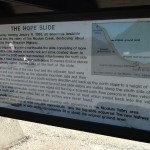
Story of the slide

The scar
Along the way, I passed the site of the 1965 Hope Slide that killed four people; two of which were never found. It’s a massive thing to see and the scar is still obvious after 45 years. I remembered seeing this back in 1982 on another drive through this area.
Border problems
Well, I had a major adventure with the U.S. border folks at Osoyoos and in the end, it took me three hours to get across. It was not a good time. To give you the flavor of it, the State Patrol was called and a Felony charge against me was considered.
But, in the end, it all came to nothing; as it always should have; if common sense had prevailed.
You see, I had three pain killer pills in a small labeled vial that I carry among my pharmaceuticals in case of severe pain such as a sudden tooth ache. Unfortunately, this vial, though labeled, had no prescription sticker affixed to it – so it was technically illegal and therein began the problems.
They finally confiscated the three pills (I got to keep the vial!) and let me go on my way after three hours of waiting, implied threats (the felony that was mentioned) and after calling for a State Trooper to make the final call on charging me or not.
It turned out (I know because I asked after it was all over and I registered a complaint) that the border officers themselves could have made the call immediately but, instead, they elected to let me swing in the wind and called the trooper to make the call.
Why didn’t they simply make the call themselves? I suspect it was the CYA (cover your ass) maneuver that many bureaucrats indulge in. You see, if they let the state trooper make the actual call, then they had no possible culpability and nothing could come back onto them later.
When the state trooper finally came, he read me my rights, chatted with me for five minutes and then pronounced me a solid citizen and said that they would simply confiscate the pills and that I’d be on my way.
So, in the end, it took me 14 hours to make it from the Vedder River Campground to Rose’s place in Kennewick, Washington. I arrived around 10:30 PM at night after a lot of night time driving on small dark country roads which I don’t particularly like. But, in the end, it all worked out.
Kennewick, Washington
Rose was my first wife. We married in 1968, when I was 21 and she was 19. I was in the U.S. Air Force at the time. Our marriage lasted until 1979 but we’ve always been good friends regardless of the fact that marriage wasn’t for us. We had two beautiful sons; Dan and Chris. And in fact, as I write this, I am staying at my older son, Dan’s, house here in Irvine, California. Chris is currently living in New Zealand – but that’s another story.
I arrived at Rose’s place in the evening of August 16th, said hello, had a beer and then went to sleep in her guest room; quite tired.
The next day, Rose and I took off for Moses Lake (another town in Eastern Washington State) in her car to pick up her great-niece, Moli, to bring her back to Rose’s where she was going to stay for a few days. Ironically, we covered some of the very same miles I’d covered the night before coming in from Canada.
In Mose Lake, we had a great visit with Tina, Moli’s mom, and several of Tina’s other kids and then we took off back to Kennewick. It was nice to do all this riding around without being the driver.
I had a quiet time at Rose’s. I don’t think I even shot a photo the entire time. Rose lives with her sister, Alice, and we all spent a lot of time visiting. We went shopping (Rose, myself, Alice and Moli) and I got some new Levi’s at the store where Rose’s works.. Back at Rose’s, Moli showed us some of her dance moves; which were great. She’s been involved in dance competitions.
Rose and I sat and reminisced that evening on her front porch about our pasts and events and people we’ve known and still know. We talked about how long we’ve known each other. We even got into our fears about our mortality and aging. We also talked a good deal that afternoon about wills and how to write them to get the results you want after you’re gone.
Unlike many couples who divorce, we’ve managed to remain good friends over the years and that is something I value greatly. We are a scattered group now; Rose, myself, Dan and Chris. But we are, in spite of that, close.

Clouds over the Cascades
On the morning of Sunday, August 19th, I took off for Monroe, Washington, for my second visit there this trip.
Monroe – a place of sharp edges
Monroe, unlike all the other places I visited on this trip, has a lot of sharp edges for me. I was married to my second wife, Sharon, for twenty years and spent almost all of those years in or near this town.
So, I have many good friendships around this area but there are also a lot of hard emotional realities here. Sharon and I have not reconciled what happened to ‘us’ and the disagreements over that tend to interfere with us being able to be friends. The divorce was only completed in April of 2011 and the wounds still sting.
Many of the people I consider good friends here are also friends with Sharon.
I’d called Sharon earlier and asked if she would let me to come by the nursery, that we used to co-own before the divorce, and take a walk around the place. I spent ten years of my life on the place working and building / repairing infrastructure and I wanted to indulge in a bit of nostalgia walking about and looking at it all.
But, I’m getting ahead of myself because we’ve not gotten to Monroe yet.
On the drive over from Kennewick to Monroe (about a four hour journey), the car began to act weird. Recall, this is the car my friend Dave, in San Francisco, had very generously loaned me for the duration of my trip.
It had been running great. But, on this leg of the trip, the oil pressure gauge began to play up. 60 pounds of oil pressure one moment and then 90 or 110 the next moment. The car itself was acting quite normally but the gauge was definitely not right.
I stopped and checked the oil and put some in but the problem continued. I called to Dave on the phone. He’s an excellent mechanic and takes very good care of his cars. We decided, after I described the symptoms, that it most likely was the oil pressure sensor itself and that I’d have it looked at in Monroe when I arrived.
When I got to Monroe, it was Sunday afternoon and none of the garages were open so the problem had to wait until Monday morning. Not being able to proceed with the repair, I took this opportunity to call Sharon and see if this was a good time for me to walk around the nursery. She said, ‘Yes’.
I drove over and parked in the lot. She had a customer so, after a brief greeting, I took off on a walk while she dealt with her customer.
I walked the public area (about 8 acres of the 25) and then I took off into the private areas and made the big loop through the back and then the front private areas. From my POV, not much seems to have changed there in the time I’ve been gone. She’s had a hard time, economically, keeping up with it the place due to the U.S. economy being such a mess. But, overall, there seemed to be lots of stock for sale and it all looked functional. Good on her.
It was strange to walk around the nursery. In the past, I’ve been over every square foot of it a hundred times when we owned it together. Projects I’d done stood everywhere. Electrical, irrigation, shovel stations, bridges, roads, etc.

Sharon August 2009
Sharon finished with her customer and came to find me and I was pretty much done with my walk by then.
We tried to talk but it turned into arguments; as it almost always seems to in the past few years. It’s sad to have spent 20 years loving a person and thinking that your marriage with them will be for life. And then to find out that you cannot even talk with them. We tried to talk that afternoon, but it didn’t really work so I left after awhile.
From the nursery, I headed over to the house of a friend named Kim. She’s a great lady and Sharon and I have known her since the early 90’s when we met her and her son walking on a road not far from where we lived then at Echo Lake (before owning the nursery).
Kim knows some other mutual friends who live just a short distance from her place so she and I walked over to Charles and Lisa’s. Lisa was there and the three of us visited for an hour or two. Charles was off in Canada for the day and their other room mate, Carey, was away as well.
Both of their properties are within the Paradise Lake Conservation District. So, it is all heavily wooded and very pretty there. It is nice to see areas like this preserved from further development.

Charles
After visiting with Lisa and greeting Charles for a few minutes upon his return, Kim and I walked back to her place. I asked if I could stay over in her guest room and she said that was fine. I was most appreciative of that kindness as the local motel where I was going to stay is a bit of a dingy affair.
In the morning, I was up and gone, before Kim was about, on a mission to get some coffee and to then see if I could get Dave’s car sorted out.
There was, of course, the obligatory visit to the local Monroe Starbucks where I saw a number of my old friends there. Then I went over to Dick’s Tire Haus to have Dave’s car looked at.
Dick did a lot of the work on our nursery equipment years ago and they’ve always treated me well. This was no exception. I talked to Phil, the manager, and he stopped what he was doing and jumped right onto my problem and two hours later, I had a new pressure gauge installed and the oil and filter changed out. All very fast and reasonable. A big thanks for all of this to Phil and Dick’s Tire Haus.
My time in the Monroe area was short and I had lots of things to do and people to see. Now it was time to drive into Seattle to see a very good friend of mine, LA Heberlein. He co-owns a small company called SpectraCal. I drove to the company and met him there and then we went over to an Ivar’s (of Clam Chowder fame) for lunch and a catch up. After that, we walked about in Gasworks Park.

LA
I haven’t seen LA since I was here in April of 2011 and I’ve really missed him. I was sorry to hear that his company is currently struggling and that he’s involved for a fight to survive. We talked a lot about the details of this I found it a cautionary tale about the dangers of growing a company too fast. But, he managed to disconnect from his problems for a few hours and we talked about a lot of other subjects that we always love to delve into.
After my visit with LA, I headed back to Monroe where I went back to Charles and Lisa’s place. Even though I’d been there just the afternoon before, we’d had an arrangement for a visit tonight and I was looking forward to more time with them.
Charles was there this time as was Carey. They served an excellent meal sitting outside in the warm evening. Charles and I talked about various computer hacking exploits and Carey showed me the wine cellar he is building for them in a previously unused space under their house. They have big dogs there and I especially enjoyed seeing them as I’ve always loved dogs and the bigger the better.
Being there with them reminded me strongly of other times I’d been there with Sharon when we were still together. So, there was an element of the bittersweet about the visit at times. But, things move on and things change. I found that my friendships with these folks have endured all of this well and they made me feel very welcome.
That evening, I asked if I could stay over and they let me use their guest room which was really quite nice – it is a huge and beautiful house. In the morning, we all got up and had coffee together and chatted a bit and then I was away again.

Robert
I returned to Starbucks in Monroe for more visits with friends. Then I walked down to Patty’s Egg Nest Restaurant to meet Robert for breakfast. He’s another good friend of both Sharon and I from years past. He runs a small nursery on the other side of Monroe. We had a good catch up over breakfast and then it was time for me to leave Monroe and head over to Kirkland to see our former tax man, Art.
Before I leave the subject of Monroe, I’d like to say to (and about) all of our (Sharon and I) common friends there; Kim, Charles, Lisa, Carey, Robert and LA (please forgive me if I’ve missed others) that you have all managed to deal with our divorce and all the disruptions that attended it with great grace and fairness. You’ve managed to not choose sides and to remain open to being enduring friends with me even though I now live on the other side of the planet.
For this, I am deeply appreciative. Your friendships and the fact that I can find a warm welcome in this, my former home town with you, is a wonderful thing. Thank you so very much, my friends.
Taxes
We’re now to mid-day on Tuesday, August 21st.
I drove to my tax man’s office in the Kirkland, Washington area. Art’s reworking our (Sharon and I) taxes from 2009 and 2010. No taxes were unpaid back then but some offshore reporting requirements hadn’t been dealt with. You see, if you as an American live overseas and do not keep the U.S. informed of your financial affairs offshore, you can get into some serious problems. And this was the danger we were potentially in and I wanted it sorted out and put right. Given my dependance on my U.S. Social Security payments to live, the last thing I needed to do was to get sideways with the U.S. Government over such issues. Today, Art had all the papers ready for us to sign, and I did. Sharon’s copies were going to be sent to her for signing and submitting.
This all went well and before long, I was away from Art’s and headed down Interstate 5 towards Alan and Rita’s place in Eugene for my second visit there on this trip.
Back to Eugene and Alan and Rita’s
Once I left Monroe, it was a straight shot down Interstate 5 to Eugene, Oregon and my friend, Alan’s place.
Again, I stopped in for coffee in Vancouver, Washington at the same coffee shop downtown and enjoyed the same coffee. Thinking all the while that you cannot put your foot in the same river twice – but you can give it a good try. And then I pressed on.
It’s nice to return to a place where you’ve been recently; It all seems to familiar. Alan and Rita have a nice guest room and it was a pleasure to arrive and simply drop my stuff there and begin to visit with everyone.

- Alan tried to Bluff me
The next day, the 22nd, Alan and I took another tour around town and ended up going up on the same bluff that he and I and Colette had gone up. There’s a great view of Eugene up there and I found myself remembering being there with Colette eight months prior.

- Yum. Sasha and Justin
That evening, we all went out for a fun sushi adventure. It was one of those restaurants where the sushi goes by on a conveyer belt and you simply grab what you like as it passes. It was Alan, Rita and I one one side of the passing parade and Justin, Sasha and a girlfriend of Sasha’s on the other side. Rita and I did a lot of sushi trading. I’m not sure that Alan’s a sushi aficionado (smile).
When I left their place, on the morning of the 23rd, I was planning to head for the Sacramento area. But, given that Alan has three sisters that all live in Nevada’s Smith Valley about 100 miles south of Reno and this is not far at all from Sacramento, it seemed reasonable that Alan might want to ride along on this leg of my trip. I could swing over to Smith Valley with him and meet everyone and he could pay them a visit. This seemed like a great idea to both of us once we’d talked about it.;I’d suggested it to him a few days before I arrived so he could think about it. So, that was the plan.
We left and cut south east from Eugene eschewing the 5 Interstate and cut through a lot of interesting country. We took highway 58 until it merged into highway 97 south through Klamath Falls and then down highways 139 and eventually, we came into Susanville, California.
It had been hot across the Western U.S. for weeks and there were serious fires in multiple states and several of them were in Northern California. As we got into the Susanville area, the shy began to be quite smoky and when we got out of the car there for a coffee break, you could smell wood smoke in the air strongly. None of the big fires were particularly close to us but they were big and the smoke was blowing eastward over this area from events closer to the Mt. Shasta area.
This area of California is semi-desert and, as we got past Susanville, the desert aspect became stronger and stronger. After we were 30 miles or so out of town, heading south east, the smoke cleared and the sky was back to the crystal clear desert sky where you can see forever.
Reno was next up. It’s a much bigger town than I’d remembered. Shopping centers, industrial areas and new neighborhoods. My memories of it were of tired old brick buildings housing gambling places mad all; of it looking like it had come off badly second best against Las Vegas.
On we drove, ever southward through Carson City and Gardenville, until we came to highway 208 east where we turned towards Smith Valley. Somewhere along here, Alan knew a market and then a small country restaurant. We stopped at the market for breakfast cereal and such and then at the restaurant for our evening meal.
After we’d eaten, we began the last lap and finally arrived at Alan’s sister, Marta’s, place after dark.
Nevada and Smith Valley
Marta greeted us when we arrived at her house and we all talked for a bit. I think it was this evening, the arrival evening, that we three went out onto her back patio and looked up at the desert skies. There’s very low light pollution in Smith Valley so there was lots to see even with the moon up in the sky behind us.
I recalled, vaguely, where we needed to look to locate the Andromeda Galaxy and, after a search with binoculars in that area, Marta found it. It is the only complete galaxy, other than the one we live it, that one can see with the naked eye; though it is just a small smudge and you have to know just where to look to see it.
This is real desert out here. Tumbleweeds and sand fill the landscape as far as the eye can see and the mountains in the distance are generally stark, bare and forbidding. But, it all has a deep beauty of its own and I was looking forward to meeting all three of Alan’s sisters (Marta, Laura and Georgia) while we were here I knew that I’d get some insights on what it would be like to actually live it a place like this.

A desert walk
The next morning, we got up and had a some coffee and some breakfast and then Alan and I went for a walk in the local area. The houses are quite a distance apart. Marta’s property, for instance, is a 20 acre piece which is about 8 hectares.
We walked part of it on the asphalt roads, part on dirt roads and the rest across country (being careful, on my part, to be aware for snakes). We found a defunct private airfield not too far away; the “Rosaschi Air Park”. Some abandoned airframes and parts were laying around and it was interesting to wander through.
After we returned to Marta’s, we all gathered up in her car and went for a tour. First, we went to sister Laura’s place and looked around. She’s got a nice place that she used to share with Marta years ago. There are at least two horses and various gardening projects scattered among the trees scattered around the house and barn. It all seemed quite nice.
We learned about the “Bucket of Death” there. It turns out that small chipmunks are absolute pests in this area and they will destroy your plants, flowers and private vegetable gardens overnight unless you fight back. Hence, “The Bucket of Death”, the secret weapon of (at least some) Smith Valley gardeners.
It’s a 5 gallon bucket filled with about 8 to 10 inches of water. Over the water, sunflower seeds are spread until they make a solid cover of seeds one layer deep covering the surface. Then, a small plank is laid to provide a ramp up to the top of the bucket. And a line of sunflower seeds led up the plank to the rim of the bucket. Up they go. In they go. Splish-splash. Bye-bye. Laura said they’ve pretty cleared the area of chipmunks with this method.
From Laura’s, we went to Georgia and Jim’s place. They’d prepared a nice lunch for all of us; myself, Alan, Marta, Laura and themselves. It was nice getting to know these folks. There were lots of questions over lunch about New Zealand and why I am there and how I like it. I also inquired as to how they all ended up in Smith Valley when most of their lives they’d all be residents of the Los Angeles basin.

- Alan, Jim and the kit plane
After lunch, Jim took Alan and I down to his airplane hanger. He and Georgia live on a property that abuts a runway. In his hanger, he’s building an airplane from a kit he got from Canada. Most of the body and wings are assembled and he’s currently working on the wiring; which looked quite complex.
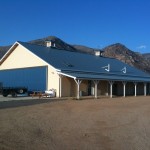
- Jim’s Hanger
We looked at all of that and then at some of their vacation photos which showed a lot of areas not too far from Smith Valley and a few others further away such as the eastern side of Yosemite. They trailer their horses to thee areas and then ride into the back country, It all looked very nice.
Jim took us back to Marta’s place and we hung out there until evening. Marta then took us to a local Mexican restaurant called Rosey’s. But, since we were a bit early, she took us on a tour of some of the lesser known parts of the valley and through areas where we could see some of the original and older buildings there.
At the restaurant, all of us from lunch reassembled again. This was primarily all for Alan ;as the brother come for a visit. I was just lucky enough to be able to tag along and join the family fun. An excellent meal ensued and a lot of fun talk.
Then is was home to Marta’s for another night’s rest before we all moved on in the morning.
Alan and Georgia were to take off down to LA to see the parents of this clan. Apparently, Georgia makes the drive once a month or so and Alan had timed things to be able to accompany her. After a few days there, he will fly back up to Eugene.
I was scheduled to depart in the morning for Lincoln, California, in the Sacramento area to visit with my friend Mike Danielson who was just on the brink of retiring from NATO where he’d been part of the U.S. mission to the NATO head quarters in Brussels, Belgium, for the last 20 years.

- Jim’s books
The next morning, though, before I left the area, I went back over to Jim and Georgia’s place. Jim and I had hit it off and he’d invited me over for a last chat in the morning before I left. We visited from about 8 to 9:30 discussing books and philosophy and then I took off for Lincoln and he left for a meeting that he was to lead.
Lincoln, California and Mike

- Lake Tahoe
My GPS routed me to Lincoln by going around the north shore of Lake Tahoe. My, that is pretty country. I can easiliy see why folks are drawn to live there. I stopped several times to take pictures.
Eventually, I got to Mike’s place outside of Lincoln. I have no idea how. Thanks to using a GPS, I just sat and looked at the passing scenery and listened to the directions it issued. And me, never caring all the while how the routing was laid out. It was just sufficient to get there – but unnecessary to know how. It reminds me of the advent of the calculator. Soon after that, folks began to forget how to do long division. Resistance is futile; ya’ll will be assimilated.
Mike wasn’t there. I was early and he was still in Lincoln doing some shopping. So, I grabbed a book and settled in under the shade outside the locked gate to his property.
When he arrived, he opened the gate and let us into his property. And what a property it was. A square piece – 60 acres (24 hectares) of lightly rolling land spread with creeks and oak trees. Empty as well; having never been developed. There was a one-room cowboy cabin on it with an outhouse. And there was a newly drilled well, a generator and a fifth-wheel trailer and pickup truck that were Mike’s recent additions. He just closed on all of this a month ago.

- The new homestead
Mike’s camp was near the old cabin. His fifth-wheel was under a large tree and it all looked quite primitive but inviting. Did I mention it was a hot afternoon?
Beers were passed and catching up discussions begun.
We’ve been friends since the late 1970’s and E-Mail buddies for many years but I hadn’t seen him in the flesh since, perhaps, the 90’s? It’s an odd friendship. I consider him one of my best friends in this life but, in fact, we’ve never lived in the same city in the entire time I’ve known him.
His daughter, Leesa and her hubby, Curt, and their two kids were due out in a few minutes for a group BBQ event. And, soon, they showed up and introductions were made.
I knew Leesa, sort of, having last seen her decades ago when she was a tyke. She’s grown up into a pretty, smart and strong woman. Her husband, Curt, works for the California Highway Patrol and he was a pleasure as well.
Soon more beers were passed around and the adults talked while the two kids continued an on going exploration of this huge property that ‘grandpa’ had bought.
Curt brought out a 22 rifle with a bull barrel and a scope on it and asked if I like to shoot. ‘Shoot, yes”, I said.
So, some tin cans and targets were set up and we had a good time saving western civilzation from their potential anarchy if we had’t instructured them in the error of their ways.

- He’s a Bubba!
Ribs were BBQ’ing and Curt took me out to see the full property on a small dune-buggy vehicle that another of Mike’s friends had left on the property for just this purpose (bush romping).
Mike intends, I beleive, that Curt and Lessa should have this great property at some point so Curt was already deep into familiarinzing himself with it. As we rode, there were discussions of the place’s history, water rights, and good places to build a house and, perhaps, plant grapes (the adjacent property was a sucessful winery). Mike’s generousity is going to open up an wonderful life and new possibilities for his daughter and Curt.
Back at camp, there were more beers, more talk and now ribs (yum). It got late and dark and Leesa and Curt packed up the kids and a good deal of the newly generated trash and departed.
Mike and I pressed on. There was still a number of bottles of wine and copious amounts of beer and a lot of talk to be talked yet.
It’s drunk out tonight

- That would be us…
I have to say, this was the most I’ve drank at one setting in many many years. At least three of four bottles of wine and uncounted bottles of beer met their maker that night. We also gave a good effort to sorting out humanity’s current problems as well.
Now Mike is basically a conservative and I am basically a liberal. I say ‘basically’ because neither of us are classical representatives of our assigned categories.
For example, I believe in the right of Americans to bear arms as a defense against the day when their government might turn despotic. And, I beleive in Capital Punishment when it is clear that someone is dangerous and inncorrigible.
Our friendship has been tested many times over the years with deep disagreements based on our liberal and conservative leanings. We’ve pushed it to the brink but we’ve never let it break us.
Tonight, at Mike’s suggestion, we did something new. We agreed to drop all references to political positions and to just discuss each issue that came up solely on it’s own merits.
I have to say, it worked briliantly well. Indeed, when we worked most issues through, freed of our liberal and conservative associations, wefound that in the end, we agreed on most of what was wrong and what should be done.
We also, sadly, agreed that the world as we know it is basically f*cked and there’s not much any of us can do. We are heading for a major die-back by our own hands.
Towards the end of this long into-the-night talk, I began to eat good quantities of the bread that was left over from the meal earlier. That’s an old hangover reciepe I learned in university. Basically, you provide your body sufficient carbohydrates and the alcohol’s biochemical decomposition will proceed by a path that yeilds benign end products. But, in the absense of sufficient carbohydrates, it will proceed by a path that yeilds products that will give you a nasty headache in the morning. I think this is unconsciously why folks like to gobble chips so much when they drink.
In the morning, after a bit of staggering about, we resolved on breakfast and to also lay out a plan for the day.
Mike doesn’t intend to live on the Lincoln property because of the tax consequences of living in California; which is a high tax state. He’d rather put the property into a trust with an aim towards leaving it to his heirs. He will go over and own a smaller place in Nevada.
One of Mike’s aims for the day was to go and look at a property at Lake Tahoe on the Nevada side. That provoked me to tell him a story about a property that one of the sisters in Alan’s family was selling in Smith Valley, Nevada. Smith Valley might be a bit a a trek but it was not beyond the realm of possibility so we resolved to go look at both of these places; Lake Tahoe and Smith Valley.
We took his big pickup truck with Mike driving. This all suited me fine as it gave me a chance to see a lot of the same countryside I’d driven yesterday without having to deal with driving. I was free to gawk at everything to my heart’s content. Into Lincoln for the promised breakfast and then off up the road to the south side of Lake Tahoe.
Tahoe was a bust. The realtor involved could not be found. It was, after all, August 26th; a Sunday. So, we pressed on for Smith Valley and I called ahead to see if we could look at the house. Yes, probably – but no promises as it was a visit on very short notice.
Smith Valley redux

- East of Tahoe
It was a long drive back the way I’d come the day before yesterday. I couldn’t help but remember that when I drove out of Smith Valley then, that I’d though to myself “It may be many years or never before I come this way again.” And then here I was two days later working my way back into this remote community to see people that I’d thought I might never see again.
We arrived at the house and, luckily, our schedules had matched and she was home to show us the place. It’s a beautiful property set among the endless emptyness of the desert. Lot’s of nature and solitude and not a small number of cyotes to keep you company as they sing at night about how empty your trash cans are and how hungry they are (smile). Plenty of snakes and bunnies as well. But good neighbors and a solid sense of community bind all of this together.
Mike looked the place over and we all talked. Me, feeling very amazed to find myself back so soon in a place, and with a person, I thought I’d never see again.
We didn’t stay too long. She had projects to attend to and we wanted to roll back up to Reno for Sushi and then we still had to make it back over to Mike’s property that evening.
Later, after some reflection, Mike decided that it was a pretty property – but a property too far from Lincoln and his kids and the 60 acres. I E-Mailed all of this back to Smith Valley soon afterwards along with our thanks for making the time to see us.
Factory Sushi
In Reno was a new type of Sushi restaurant. It was an all you could eat for a fixed price. $22 USD when we visited. Mike said it was $18 last year. It was a new business model for me but it didn’t take me long to work it out.

- Factory Sushi!
You sit and they ask you what you want and you tell them and “Wham” in 20 seconds, it is there. And maybe twice as much as what you’d asked for. Lots of free things come by as well. “Here, this is a good one. Want to try this one?”
The basic plan is to fill you up as soon as possible so you’ll clear the seat at the sushi bar and the next $22 can sit down.
The food was good but it’s not the ambiance that I look forward to in a sushi place. Also, most of the servers were of Mexican or Latino extraction and that also seems a bit odd in a place with such an oriental orientation. Sushi factory mode is what I’m thinking.
Back to Mike’s place. One or two beers (I’m feeling cautious now) and a bit of talk and then off to bed. This was my first time in a fifth-wheel trailer and it’s rather cool; how nicely configurable they are. His dining table nook converts into a bed in about three minutes. Very cool.

- Brotherhood!
In the morning, it’s back to Lincoln for another breakfast. This time at Awful Annie’s. We shoot some photos, pledge endless brotherhood and then our lives divide again for who knows how many years.
A small interlude about the dying of the light
Life is a strange business. It all seems so endless when you are young and so transicent when you get older. These days, I wonder with each event, if this is the last time. Not that it matters. I’m not in angst here – just wondering. I know we all go; myself included. If anything, these perceptions have made me think to spend all the remaining minutes of this life well and thoughtfully No regrets avoiding habits and looking for what’s new. Keeping the brain and body engaged and looking squarely and everything that arises including the end.
With the GPS engaged and my mind on gawk, I drove west towards the San Francisco Bay and Benicia and a night at my friend, Dave’s.
Benicia in a blur
I arrived back at Dave’s place in the afternoon of August 27th. This was my 3rd visit to his place thus far on this trip. The plan was to do an over-nighter and then to press onto Orange County and my son, Dan’s, place the next day.
That night, we watched the movie, Dark City. I liked it. It reminded me of the Raymond Chandler books (Philip Marlowe private eye stories) which I’ve been reading on this trip.
The next morning, I was up again and off to coffee at the local Starbucks and then away towards Orange County.
Many thanks to Dave for all his hospitality and patience with all my comings and goings. His house and his friendship have been central on this trip.
The California Central Valley
The trip down to Orange County was, again, done on Interstate 5. It is a fast but quite boring road. It cuts through California’s Central Valley on a line designed to make the fastest transit. But, when they designed it, they didn’t route it through any towns of size. So, it is endless flat, hot agricultural miles punctuated periodically with small gatherings of house trailers, truck repair shops, motels, hotels, restaurants and gas stations that exist for no other purpose than to service those passing on the Interstate.
These places have names but they seem nameless. Once you’ve eaten or filled up and then pulled away, it’s hard to remember where you’ve just been.
It was at one such place that I stopped for gas and a meal on the 28th. There was an Apricot Hotel and an Apricot Restaurant there baking in the valley sun. I parked, as usual, in a place where I could see the car from within the restaurant and went in.
I found a big gift shop filled with doo-dah that parents might have to buy their bored kids on a long ride to quell a back seat rebellion. The place was like a small self-contained world within. A barber shop, a beautician, the big gift shop, showers (for the long distance travelers and the truckers) and a large restaurant. And all of it air-conditioned.
I always wonder, when I come to these places, where the people come from that work there. Do they live in the house trailers scattered about? Did they just drift in and stay? Did they grow up in small communities in the area and this was the ‘big time’ for them? It was hard to tell looking at them because they just saw me as part of the endless passing stream of travelling anonymous folks who would be gone in 5 minutes. So, they were’n’t going to reveal a thing.
Outside, the parking lot glowed evilly with the mid-day heat. Beat down trees and the odd 55 gallon drum made into a trash can rounded out the attractiveness of the place where cars were left to bake.
But, I didn’t care. I had a Phillip Marlowe private-eye novel and a BLT and a coffee. My biggest problem was that the longer I lingered there, the longer it was going to take me to arrive. Outside, the implacable highway waited for me. Let it wait, I thought.
And it did.
I finally got back on the highway and continued to roll through the flat, hot countryside wondering, as I always do in such places, what would possess people to live in such places. Of course, there are always reasons like family and businesses to keep them. But, being of the travelling sort, I always think I’d have left.
Finally, the hills at the southern end of the valley began to appear through the heat haze presaging the Grapevine up and over the mountains into the northern end of the vast Los Angeles basin.
Somewhere near Culver City, I needed fuel and used the GPS to direct me to a station. The first one it took me too didn’t exist anymore but the second one was still present.
Gas Stations in this area are like forts. The attendant sits in a room like a bank teller behind glass and manages things. You take your cash or credit card up and turn them in before you pump your fuel. Apparently, drive-offs and fuel thefts are a major threat in the area. It was an older and tired looking neighbrhood so I could see the problem.
Finally, late on a hot afternoon, I arrived back in Irvine, California, at my son’s place.
Irvine – the second visit
I’d already been to Dan’s place once before on this trip from July 21st to August 3rd. At that time, my first wife, Rose, and her sister Alice and her daughter (from her 2nd marriage), Jenny, were all there as well. It was a full house and great fun.
But this second visit was so I could spend more time one-on-one with my son, Dan, and his lovely family; Ann, his wife, and Cody and Eden, their kids.
Dan and Ann are the epitome of California to me. Busy, intense and yet, through it all, relaxed. They each work schedules with a huge variations in them. And yet, through all of this, the kids get fed, loved, played with and off to school without a flaw. Finances are tight, but the love in their house is tangible. Dan and Ann are both truly originals.
The week here was full of many adventures. Some planned and some just made up on the spot.
Some days, I rode along with Dan on jobs and estimates or to go into one of the big building supply stores for materials. It’s a pleasure to watch him work. He’s quick, concise and decisive and he’s unbending on quality. He’ll put something up for a customer as cleanly and skillfully as he can knowing all the while that they are likely to ask him to move it up or down tomorrow by two inches. He never misses beat on this stuff. He’s got a clientele that love and trust him and I can see why. If you are going to invite someone into your house to knock out a wall or to rewire something, he’s the guy you’d want.
The week had too much detail to render it all so I’m just going to hit some highlights.
The Battleship Iowa

- Dan and Cody with the USS Iowa
One day, Dan, Cody and I went to San Pedro to see the Battleship Iowa which has been stationed there since early July as a permanent exhibit. It is an immense thing with a huge amount of history.

- Cody and the big guns
One bit that impressed me a lot was being in the stateroom where President Roosevelt spent 9 days on an Atlantic crossing on his way to meet Churchill and Stalin at Yalta to discuss how Europe was going to be divided up after Nazi Germany fell. I looked at that room and at the ship around me and wondered how it must have been to be the president of the United States on one of the world’s most powerful ships sailing on such a mission. And thinking that however it was for him, it all happened in that room where I was standing.
It was a great grandpa, dad and kid outing. Afterwards, we went to Ports-of-Call which is an area of restaurants and shops along the San Pedro waterfront.
San Pedro, Ports-of-Call and The Nichols Institute
Interestingly for me, I used to work at the Nichols Institute for Endocrinology there just above Ports-of-Call in the late 1970’s when I was fresh out of University and on my first job. Nichols was a ragingly successful laboratory then and I was very lucky to have gotten in with them when I graduated. It was all high-tech and interesting with very bright people and I loved it. They employed a technique called Radioimmunoassay which involves radioactively labeling antibodies and then binding them to a substance in the patient sample that you wanted to measure the levels of.
I began as a lab assistant there, advanced to doing research chemistry and then dropped it all in favor of assuming control of their computer systems. It was a heady time. And, once into computers, I never looked back or mourned my Microbiology training.

Logo
So, back in the day, we used to come down to Ports-of-Call from the Institute and have lunch. Back in the day when computers were as big as refrigerators and had to live in cooled rooms. Back when we used paper tape to upload new operating system software into them and when a system that ran a maximum eight users in 32K was considered way out on the edge. Back when hard disks maxed at 300MB and were as big as a large washing machine and shook just as much.
Yeah, I saw all that looking up the hill at the old building as we walked into Ports-of-Call. People and things long gone but seminal in my life.

- LA Afternoon
Ports-of-Call had changed too. It had becomes the place where, apparently, every Latino in East LA now comes, on a warm Saturday afternoon, to have lunch and hang out. It was packed and hardly a northern European face to be seen anywhere. There were Mariachi Bands standing in among the diners at the long tables under tha canvas ceilings and families of every size filling the seats. Kids were running and playing. Couples were courting. Cholos with fierce tattoos were holding court, possessing their women and watching their surrounds.
It didn’t feel particularly dangerous but it did feel like a place where you needed to stay a bit aware of your surroundings and what was going on. Cody, of course, wanted to run around amid the excitement but Dan and I kept close track of him.
We walked from one end to the other trying to decide where to stop for lunch and finally settled on an inside sit-down place. There wasn’t much question of what to eat. It was going to be either Mexican food or something related to the sea since we were in a harbor venue – but that was fine. We had a nice lunch with a friendly waitress who took a special interest in Cody and we all watched the shifting scene among the many tables under the canvas just outside the window we were seated at.
Black Star Canyon and the lost history of Orange County
On another day, Dan and I took a hike up Black Star Canyon. Dan’s an avid fan of all things to do with the back country in Orange County. He mountain bikes there , he hikes, he maintains and cuts trails and he researches the history of the area.

- Dan at Black Star Canyon
On Google Earth, he’s seen old road beds unused for 100 years. He’s also read several books by old-timers who mention places and things which are now lost. He studies what’s known and tries to find them again. One notable place he’s been looking for in Shark Tooth Hill. It was mentioned in an old book but the clues are insufficient to locate it but he’s narrowing the search down.
On another occasion, when Colette and I were visiting Orange County last January, Dan took Lare-Dog (another friend of all of ours) and Colette and me up to see a clearing that he’d located on Google Earth and had finally worked out how to get to. It was large – maybe two acres – but it was well off any trail and, apparently, no one goes there as there seem to be no trails to it. Sometime, long ago, it must have been cleared for something but now, it just sits out there in the deep bush unseen except from satellite.
On another visit when I stopped over on my way from Seattle to new Zealand, he took me out to the Joshua Tree area and we hiked back into the hills and he took me to an old miner’s camp back in a canyon. All the old stuff from 1890 or so was still there basically untouched. They’d made a shelter of sorts in a cleft in a cliff and you could see that someone had spent a lot of time on it.
I also appreciated, on our hike out to Black Star Canyon, that a lot of reclusive folks live out in places like this. People who seem to want to avoid other people and to just to be left alone. Dan told me that some of these folks can get seriously irate and even dangerous if they think you are getting into their space. We saw barbed wire fences, security cameras and lots of no trespassing signs in some areas.
Cody’s Birthday

- Cody and Eden
One of the reasons I’d gone back for a second visit to SoCal was because of Cody’s birthday. He was nine this year.
The party was held in Irvine at a private park open to residents of the local housing association. Ann’s parents, Bernie and Sally, live in the association so we had entry.
It’s a beautiful place. Irvine is, truly, one of the better places to live in the United States in my opinion. Great weather, beautiful houses, shopping centers, infrastructure and affluence bless it.
Oceanside and the passing of a friend
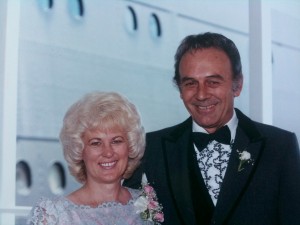
- Marty and Sherry’s Wedding
On September 3rd, I drove down to Oceanside repeating a drive I’d done back on July 29th on my earlier sojourn to Southern California. My friends, Marty and Sherry and their daughter, Teri, have lived there for forty years.
This was a sadder occasion than the first visit as Marty had passed away on August 11th not long after my first visit.
Marty was a seminal figure in my troubled teenage years. He was the Big Brother / Father figure who stepped forward when I was 13 and desperately needed someone like that in my life. He showed me how to see the world through a man’s eyes and how to use tools and to design and make things. It would be no exaggeration to say that he was one of the most important influences in my life.
When I arrived, I could see that Sherry was going through all of Marty’s stuff sorting things out. I found her calm and settled. I think she’d been expecting Marty to pass for sometime.
She’d told me that she’d found some papers that he’d filed in his things that had to do with me. I was curious as to what they might be and after we’d visited awhile, she brought them out.
They were letters from the United States Air Force to Marty and Sherry dating from 1967. When I’d joined the service in 1966, things were badly strained between my mother and myself and so I’d listed Marty and Sherry as my parental contacts.

- Two sweet women in my life
I’d done well in the Air Force’s Electronics school in Biloxi, Mississippi, and these letters were commending my performance and informing my parents of my success. It was quite strange to see them after all these years. I had only the vaguest memory that they’d ever been written.
Sherry and I talked about her plans and of Marty’s passing and then their only child, Teri, came over. She lives two doors down from Marty and Sherry’s place. Teri was mourning her father’s passing and she cried for awhile and I held her hands in mine until the storm passed. Then she told her story of how it had all happened. It was all both sad and yet so inevitable in a way. We all age and we all go.
Of course, no one who has just lost a loved one wants to hear such thoughts because of the immediacy of their pain. But, never-the-less, it is a profound and simple truth about these lives we are leading. We come and we go like the fields of grain that rise and fall each year.
Sherry talked about her early history in North Dakota before she’d come west to Los Angeles and met Marty. These were stories I’d never heard. I suppose I found it hard to imagine a time in her life before Marty; since I’d always known them as a unit. She named the towns she grew up near but said there was no place there to call home for her anymore and that there hadn’t been for many many years.
She showed me a sweet picture of her and Marty when they’d gotten married and they looked just as I remembered them from when I met them at 13 in 1960. I took some digital shots of the picture (see above) so I’d have a copy as well.

- Teri, myself and Sherry
We talked about their plans now that Marty was gone. They are going to do some shuffling of who lives where between the two houses and Teri’s older son, Jason, is going to come and live in the big house where Marty and Sherry lived. We walked over and looked at the 2nd house and Sherry showed me where they are making her an apartment in the back. Teri and her partner are going to live in the front of the same house.
In a way, it was all sad. But I think the more predominate feeling was that every thing changes and they were going to go with the flow willingly.

- we are shadows…
New places to live, new ways of doing things, and of how you were going to spend your days.
Our resilience as human beings amazes me.
As I drove back up the California coast from Oceanside to Dana Point and then inland to Irvine, I looked at the summer sunshine and nothing had changed. People were still in their cars going to do something important somewhere. The birds still wheeled in the sky and the sun still shown down on it all as it always had.
The Coffee Shop
In Irvine, on one of the first days of my second visit to Dan’s, I was sitting in a coffee shop reading a book and enjoying a Vanilla Latte. Near me, a group of six or seven people were talking and their conversation kept drifting into my awareness. The themes were those that I think about a lot. Ecological and political stuff and how it is all likely to turn out.
Finally, I couldn’t pay attention to my book anymore and I got up and walked over to them at the next table. There was an empty chair and I asked if I could join them. I explained that I’d found their conversation interesting.
Smiles and handshakes all around and I sat down with them.
It was an amiable and diverse group. Over the next week, I joined them on four different occasions. Mostly men, there were also two women who came and went. One fellow was Chinese, another was Korean and yet another was Iranian. the balance were Caucasians, like myself. As I saw it, the group loosely consisted of, perhaps, 10 to 12 people. They met nearly every afternoon Monday through Thursday at about 4 PM at this coffee shop.

- Coffee Shop Group
One of the youngest among us was the Korean fellow, James. He was also probably the spark plug of the group. I have to say I loved his take on things and his deep and restless curiosity and drive to understand how and why things are as they are. He’s one of those people who have a relentless intellect.
We all talked for hours on a wide variety of subjects. But, when the talk came around to how the world was doing ecologically or politically, it invariably followed the same arc. We could start from any where and we always end up at the same place saying, “We’re doomed”.
I sure we must have sound demented as we laughed at our repeated conclusion. But these were all bright and thoughtful people with a lot of life-experience among them. For some reason, they’d escaped what seems to afflict most of us; which is a desire to deny and to turn away from what’s really going on around us in the world.
I enjoyed this group immensely and I joined them at every opportunity until it was finally time to head back north towards San Francisco.
Last morning in Irvine

- Sunlit blessing
Cody and Eden’s school holds a morning gathering one day each week and parents and family are encouraged to join in. I joined Dan, Cody and Eden to attend one of these on my last morning in Irvine.
It was an interesting assembly. Lot’s of warm family feeling and group energy. It’s a Jewish school with the boys wearing Yamakas and Hebrew and English freely intermixed everywhere you looked. There seemed to be an air of genuine participation in all that I saw across the entire age spectrum. So, unlike what I recall from my own secular and mass-produced schooling.

- Cody and Dan
Jewish people hold a special place in my heart given my family ties and my deep friendships with various Jews. And, as the years have passed, these bonds of liking and affection have only grown. I’ve known that there was something very special about these folks ever since I read James Michener’s, The Source, so many years ago.
I can’t say I always agree with the actions of the Jewish State but I absolutely love the people of this beautiful culture that has endure so much for thousands of years.
North for the last time
On September 7th, I departed from Dan and Ann’s place heading north to San Francisco on the last leg of my 10 week journey. This time, I was up and over the Grapevine from the southern side. On my previous exit from the Los Angeles basin, I’d cut east towards Lancaster, Edwards Air Force Base and highway 395 up California’s backside.

- The long road
Did I mention that there’s nothing remarkable about driving on Interstate 5? Yep, I drove all the way back up to the Bay Area and watched closely and nothing remarkable happened.
I finally needed gasoline about Livermore. Interesting area around there. Coming in from the south, there are a zillion wind turbines. It’s the biggest collection I’ve seen. The second biggest would be out near Palm Springs.

- David Christensen
I pulled into Dave’s place in Benicia in the afternoon for my fourth visit of this trip. His house has been the center point for all my traveling on this extended trip.
I flew into San Francisco and I’ll fly home from there as well so it makes a lot of sense. He has been endlessly kind and generous with his time and his house. And not to mention that he’s let me use his second car, a sleek ’98 Camero, for the duration of my travels. Truly, that’s hospitality and friendship of a high order.

- Dave’s House
The last week at Dave’s was mellow. I did some more time down at the community pool.
We watched some excellent movies ( “The Hunter“, “The Tracker“, and “Serenity” ).
We ate lunch down at Sailor Jack’s, which is an excellent restaurant in Benicia.
We fixed an internal door in Dave’s place that had been sticking and we changed the oil in the Camero that I’d driven over 5,500 miles (8,800 km).
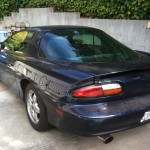
- Dave’s sweet Camero wheels
It was all relaxed. Dave and I have been good friends since the early 70’s.
But, I knew my departure was looming and my thoughts were beginning to shift in a southerly direction and towards Brisbane and Noosa where I was going to meet Colette and spend a week of beach time vacationing with her after this long separation.
So, on Friday, September 14th, Dave drove me to the Concord BART station with my two now heavier pieces of luggage and off I went.
Next stop, Australia…. And what a nice sojourn in the U.S. it had been.
Many thanks to so many people who’ve put me up in their spare rooms and on their couches. And my very special thanks to Dave who made all of this possible for me with his friendship, hospitality and generosity.

End of a very long story. Thank you for reading it.
Dennis































































